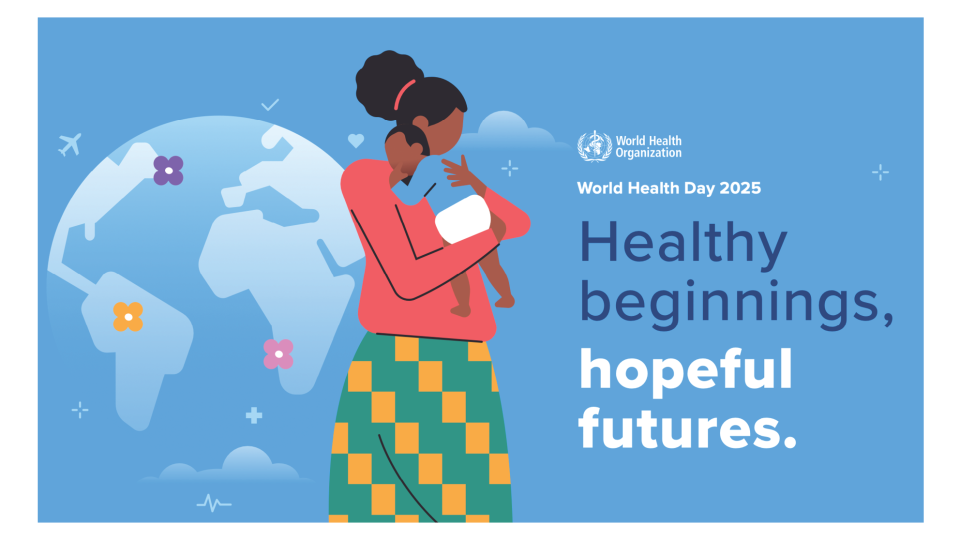ICN endorses World Health Day theme and urges immediate investment in nursing to support maternal and newborn health

The International Council of Nurses (ICN) strongly supports the 2025 World Health Day theme focusing on maternal and newborn health and emphasizes the urgent need for increased recognition and investment in nursing as the path to effective and accessible care for all women and children. To mark World Health Day, today, 7 April, the World Health Organization (WHO) has released a new “Trends in maternal mortality 2000-2023” report and launched a “Healthy beginnings, hopeful futures” campaign to intensify efforts to end preventable maternal and newborn deaths and prioritize women's health and wellbeing worldwide.
WHO’s new report reveals that every day in 2023, over 700 women died from preventable causes related to pregnancy, with a maternal death occurring almost every two minutes. Global health inequities mean that these issues disproportionately affect vulnerable populations, with over 90% of all maternal deaths concentrated in low– and lower–middle–income countries in 2023.
ICN President, Dr Pamela Cipriano, remarked:
“This alarming new data reflects a continuing crisis in maternal and child health that requires immediate action. The statement issued today by UN agencies recognizes the urgent need to invest in nurses and midwives to reduce this tragic and preventable loss of life and improve health for mothers and babies.
‘For far too long, the essential role of nurses in maternal and child health has been chronically undervalued, underrecognized, and underfunded. Nurses are vital throughout all stages of women’s and reproductive health care, providing the best possible care throughout family planning, antenatal care, childbirth, postpartum, and early childhood development. Beyond their lifesaving clinical skills, nurses also build trusted relationships with women, families, and communities, providing essential education and advocating to improve quality of care. Advanced practice nurse-midwife roles are especially critical to deliver the comprehensive and preventive Primary Health Care (PHC) needed to address maternal and child health challenges and increase access to care.
‘In the face of these shocking statistics, ICN urges the world’s leaders to support nurses as champions of maternal and newborn health by investing in sufficient nursing staff, in decent working conditions, in all necessary resources and by involving nurses in the development of key maternal and child health policies and providing them with continuing professional development, education, and training, including simulation-based training programmes. By enabling nurses, we enable mothers and babies to survive and to thrive.”
ICN actively supports nurses in under-resourced regions working to achieve health goals including improved maternal and child care. Through the Organizational Development of National Nurses’ Associations (ODENNA) Africa programme, ICN recently supported the Australian College of Nursing (ACN) and the Uganda Nurses and Midwives Union (UNMU) in a project to improve pre- and post-operative care for mothers who undergo caesarean sections based on research assessing care quality and strategies and best practices to improve maternal care and education.
Agatha Nambi, a Ugandan nurse participating in the project, shared: “This research gives us hope. For years, we've seen mothers suffer, and we've felt helpless. But now, with this research, we will have the data and support to make real, meaningful changes.”
Dr Cipriano said: “This positive example shows the transformative impact of properly supporting nurses with education and resources in order to reduce preventable deaths and improve the quality of maternal care. However, without sufficient, well-resourced, and well-trained nurses, midwives, and health systems, we will continue to witness preventable deaths and widening disparities in maternal and child health worldwide. Women, and in particular nurses, make up the vast majority of the healthcare workforce, so let us be clear maintaining the traditional status quo of undervaluing women by perpetuating patriarchal practices and restrictions is unacceptable. Neither nurses nor women are dispensable. They are essential to the health of nations and the world.
‘Gender disparities in health care systems undermine nurses’ contributions. Women in our health care systems often receive lower compensation, less recognition, and fewer leadership opportunities. This hinders progress towards gender parity and resilient health systems.
Later this month, ICN will release its International Nurses Day (IND) 2025 report and survey of National Nurses’ Association (NNA) Presidents. These reports show evidence of chronic understaffing, under compensation, and unsafe working conditions, which jeopardizes the sustainability of the nursing workforce needed to meet maternal and child health needs.
‘As ICN has reported, recent funding cuts including the withdrawal of USAID funding will have devastating consequences for mother and infant mortality. ICN’s National Nurses' Associations (NNAs) and nurse leaders worldwide have told us of severe impacts on programmes supporting maternal and child health and nurse leadership in many vulnerable regions.
‘This World Health Day, as WHO launches its “Healthy beginnings, hopeful futures” campaign, ICN calls on all governments and global health leaders to take action and invest in nursing and in affordable, accessible health care for all. These can be no healthy beginnings or hopeful futures without supporting and enabling nurses as the cornerstone of effective maternal and child health services worldwide.”